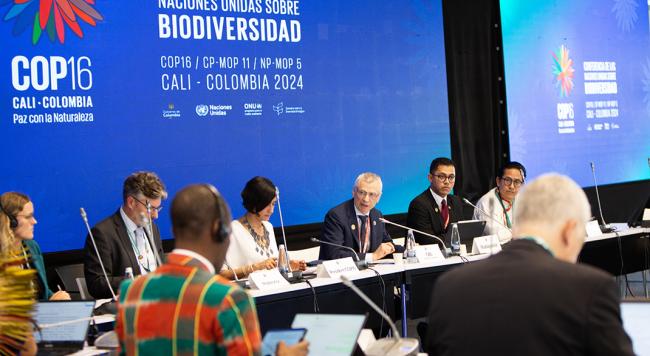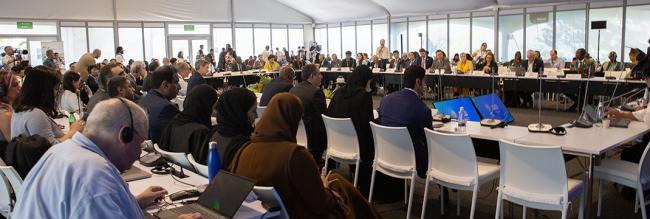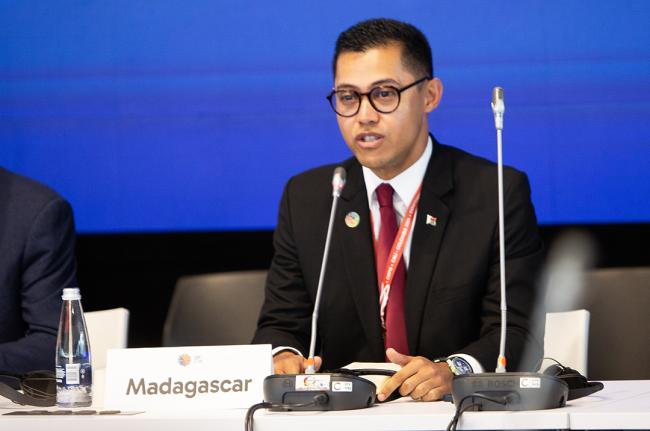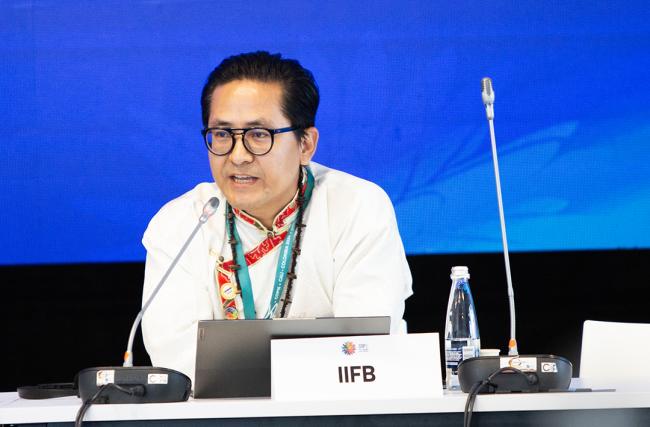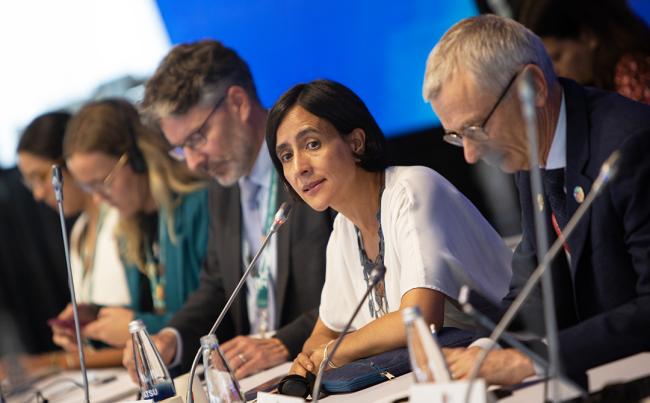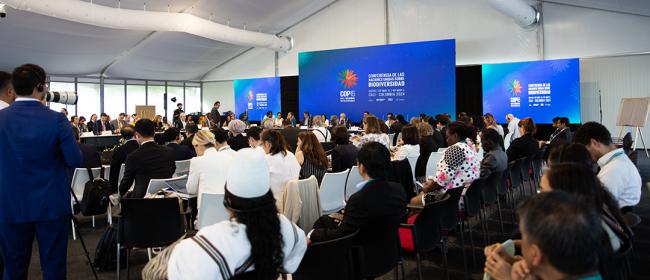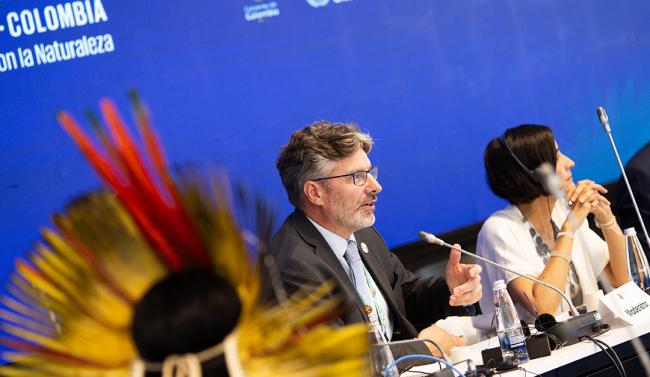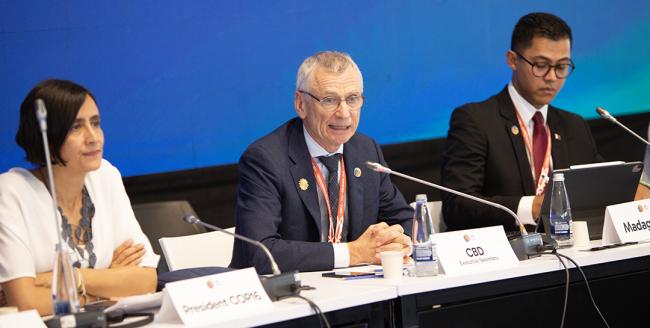About
National Biodiversity Strategies and Action Plans (NBSAPs) are the main instruments for implementation of the Kunming-Montreal Global Biodiversity Framework (GBF). This event, a dialogue among ministers and Indigenous and community leaders, provided a platform to discuss opportunities and challenges faced in global biodiversity conservation.
Implementation of the GBF is the next big challenge regarding global efforts to conserve the world’s biodiversity. National targets and strategies are crucial in this effort and it is urgent that a whole-of-government and whole-of-society approach be adopted for global biodiversity conservation.
María Susana Muhamad González, COP 16 President,opened the high-level segment on the urgent action for implementation of the GBF. Reiterating that COP 16 is an implementation COP, she asked for an open and frank discussion on how to create better mechanisms and address the challenges that hinder GBF implementation.
David Cooper, Deputy Executive Secretary, Convention on Biological Diversity (CBD), noted that nearly all countries are developing their NBSAPs and that national targets, a key aspect of NBSAPs, are aligned with the GBF. He cited a need to link these with the ongoing climate process to see what it can do for Nationally Determined Contributions (NDCs).
Moderator Neville Ash, UN Environment Programme-World Conservation Monitoring Centre (UNEP-WCMC), asked ministers to consider three topics: political and technical strategies that have been undertaken by Parties to ensure a cross-sectoral and whole-of-society approach in their NBSAP updates; political and capacity-building challenges at the national and local levels; and national institutional arrangements needed to assist in fulfilling their obligations under various multilateral environmental agreements, including reporting.
Max Andonirina Fontaine, Minister of Environment and Sustainable Development, Madagascar, emphasized that now is the time to take implementation seriously. He expressed optimism with progress to date on digital sequence information (DSI), a potential new fund, and new pledges made for the GBF Fund. For megadiverse countries like Madagascar, he said implementation is not an option but a matter of survival, and urged Parties to work together toward successful implementation.
Lakpa Nuri Sherpa, International Indigenous Forum on Biodiversity (IIFB), highlighted the work of Indigenous Peoples and local communities (IPLCs) since COP 15. He cited examples from Asia, notably the Philippines, where IPLCs created their own Biodiversity Strategy Action Plan. He emphasized that challenges remain, including inconsistent participation and a lack of direct resources for IPLCs to engage fully and effectively in CBD and NBSAP processes. He urged Parties to approve the creation of a permanent IPLC subsidiary body at the CBD that would contribute to full and effective participation at international and local levels. He asked Parties to “truly make this COP the COP of people,” and provide a permanent home for those who already live in harmony with nature.
During the ensuing discussion, participants expressed support for the whole-of-government and whole-of-society approach to effectively implement GBF goals and targets. They also highlighted the need for well-defined and science-based indicators to help countries achieve effective biodiversity conservation. One party noted that some headline indicators are still missing, and that component indicators are not enough.
They identified the challenge of balancing competing interests, such as conservation and economic growth, and political and operational issues. Recognizing these challenges, Parties emphasized the need to mainstream biodiversity conservation across levels and spheres of government, and to include participation from all stakeholders, such as IPLCs, Afro-descendants, farmers, NGOs, philanthropy, women, and youth.
One delegate reiterated the vital role of IPLCs as guardians and protectors of the world’s biodiversity and called for more financing and mobilization of resources. Parties emphasized the critical role of proper financing, direct access to funding, effective resource mobilization from all sources, and the need to redirect and eliminate harmful subsidies. Some urged Parties to approve a collective fund for DSI benefit sharing.
Delegates emphasized the need to translate the GBF into action. Several highlighted the urgency brought by the triple planetary crisis, and the need to tackle biodiversity, climate, and pollution in an interconnected way.
One Party emphasized the need to carry momentum over to the upcoming UN Framework Convention on Climate Change COP and UN Convention to Combat Desertification COP to “deliver on promises made to humanity.” Another participants noted the importance of ratifying the Biodiversity Beyond National Jurisdiction Agreement (BBNJ) to help achieve the 30-by-30 target under the GBF.
Some shared national experiences of implementation actions – including having a gender-responsive national advisory council for biodiversity – and underscored the need to engage with all stakeholders.
Several speakers emphasized the critical role played by technological innovation, the need for creative solutions, and free and accessible data. Another underscored the need for data harmonization across different conventions and welcomed the use of data reporting tools. Some also highlighted the critical need for transparency, monitoring, and reporting, so Parties can assess progress.
Specific conservation actions that were mentioned included support for a bioeconomy, restoration, sustainable agriculture, sustainable use of resources, and the establishment of protected areas and other effective area-based conservation measures. One Party noted the devastating effects of war, saying it harms not just people but also biodiversity. Another called for better articulation of the benefits of conserving biodiversity.
Muhamad expressed optimism in the reality that every country is taking action toward implementation. She noted that many Parties are adopting a whole-of-society approach, emphasizing widespread stakeholder consultations. She praised the remarkable mobilization of IPLCs, who are taking ownership of policies, and underscored the importance of such ownership in a whole-of-society approach, in contrast to top-down policies. She called for resolving contradictions between economic growth and biodiversity conservation, and advocated for new economic pathways to avoid past mistakes. Muhamad reminded countries they have 72 hours remaining at COP 16 to create the instruments needed for transformative change.
Organizer: COP 16 Presidency
Financial and technical support: German Cooperation
Contact: prensa@minambiente.gov.co
For more information: https://www.cbd.int/conferences/2024/cop-16-hls
To receive free coverage of global environmental events delivered to your inbox, subscribe to the ENB Update newsletter.
All ENB photos are free to use with attribution. For the 2024 UN Biodiversity Conference, please use: Photo by IISD/ENB | Angeles Estrada Vigil
Selected Images

Steffi Lemke, Federal Minister for the Environment, Nature Conservation, Nuclear Safety and Consumer Protection, Germany

Maurice Ntossui Allogo, Minister for Water and Forests, Environmental Preservation, Climate and Human-Wildlife Conflict, Gabon

